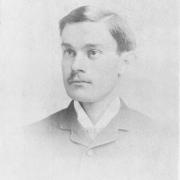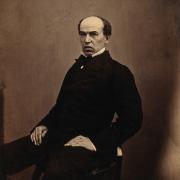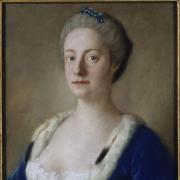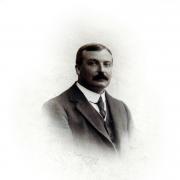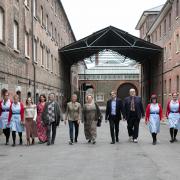Shoreham’s Duck Master on running a busy lavender farm, family ties and being High Sheriff in a year notable for its historic milestones
For someone who claims he as “never very good at history at school,” William Alexander is catching up fast.
The Shoreham lavender grower and farmer, Kent’s High Sheriff, faces a year that, on top its many and varied responsibilities, contains two major anniversaries: Magna Carta’s 800th anniversary and the bicentenary of the Battle of Waterloo.
Fortunate, then, that he is married to Caroline, daughter of the founder of Ladybird Books; the publishing house’s re-issue of King John and Magna Carta and The Story of Napoleon has been incredibly helpful is getting them both ‘up to speed.’
Our conversation takes place in the family farm where William, 63, grew up and the couple raised their own family of two boys and a girl, now all young adults and the eldest, Lorna, a mother of two.
“My great grandfather moved down to Kent from Scotland in 1892 bringing a herd of Ayrshire cows with him on the train. Castle Farm was bought in 1932 and my parents moved in here in 1951.
“When Caroline and I were married we moved into the farmhouse after five or six years and brought up our family here. I was brought up here as a child and have lived here most of my life; my roots are here.”
It was evident right from the Installation Service in March at neighbouring St Botolph’s Church when, at the reception held in Lullingstone Castle, Caroline kicked off her shoes, jumped onto a settle and gave an excellent speech to the assembled guests about the role and year ahead, that this is very much a joint endeavour.
And that hsn’t changed in how the Alexanders tackle their Shrieval year; they are in it together, as is the whole family.
Caroline, who studied architecture at Cambridge and took an MSc in Landscape Management at Wye College, works side by side with her husband running their mixed farm, which is predominately arable, livestock, hops and lavender.
Renowned for the latter, they grow more than 95 acres of the fragrant crop and extract their own range of essential oils on site in a steam distillery. Their exclusive range of lavender oils, culinary essences, toiletries, dried flower-heads, gifts and foods are sold in their farm shop and online.
Eldest son Thomas took the photographs featured here and will continue to record his father’s year in office, while youngest son Crispin, who finished his degree in chemistry at Dublin last autumn, is a partner and currently managing the farm.
“We’ll see each other every morning and Crispin will look after everything,” says dad. “He’s on a learning curve too, so it will be an incredibly busy year for both of us, but I am dropping some commitments in order to devote time both to the business and to the Sheriff side.”
These commitemnts range from agricultural committees he would sit on to entering his home-grown vegetables in the village show, but won’t have time this year.
One local role William didn’t ‘duck,’ however, was his annual ritual of being the Duck Master for Eynsford village’s annual duck race, always held on the first May Bank Holiday Monday.
“I’m the man who runs the duck race, standing in the middle of the river, dressed in a bright yellow sou’wester. The local children make ducks of all sorts of designs and it’s a real family event with prizes for design as well as the winners of the race.”
While the Alexanders are based in the far north-west of the county, they are relishing the chance to learn more about the Garden of England. In March, they ordered a huge map of Kent “so we could really plot where we are going and make sure we cover the whole county in the year,” says Caroline.
She adds: “Because it is such a busy time for William, the more support I can give the better and I will be accompanying him to as many events as possible – it’s such an incredible opportunity to learn more about the county and meet people you wouldn’t have otherwise met. I can help formulate ideas as to how we can make the year relevant. It’s very much a partnership.”
William says: “Kent is such a big county with such a dynamism – it’s got this huge coastal area, ports, industry, agriculture, horticulture, two cathedrals - so there is a complete breadth of what one might be involved in and events one might attend or support across the county. I am particularly keen to go to some of the less-visited places.”
Indeed, their travels have already taken them to magistrates and coroners’ courts in Thanet and to the prisons on Sheppey, where they became interested in the idea of education in prisons and combating illiteracy – here again, Caroline’s Ladybird Books’ connections can come into effect.
The work of the Shannon Trust to improve literacy in UK prisons has really impressed them. Started by Christopher Morgan in 1997 following a lengthy correspondence with a life-sentenced prisoner, Tom Shannon, the scheme is run by The Prison Reform Trust.
Through Tom’s letters, Christopher learned about prison life and the shocking levels of poor literacy amongst prisoners.
In 1995 the letters were put together in a book called Invisible Crying Tree, the royalties from which were used to found Shannon Trust. Since then it has worked closely with prisons and prisoners to make the Shannon Trust Reading Plan available to those prisoners who could benefit from improving their reading, or being a mentor.
“We saw in Swaleside some fantastic initiatives where they are trying to imbed education into all their activities,” says William. “One example was where somebody hadn’t wanted to sign up for any study work in maths or English but was very keen on sport and exercise.
“If they wanted to spend more hours in the gym, then they need to do some study and get some qualifications. This approach is being used more and more as a way to motivate prisoners to better themselves.
“We spoke to one girl who was being released from prison and she said ‘prison had made me a better person because I am going out with improved skills and I am going to get my life back in order.’
“There are so many initiatives in place already and we are discovering more as we go.” Examples include the good work they have seen being done by prisoners, from a “huge and well-automated” laundry facility that did the washing for the prison to training courses in brick laying.
As well as education being an area of keen interest, William is looking forward to making introductions and connections between the different arms of the justice system, bringing together busy people with little time for networking.
He is also passionate about Safer Kent, formerly Kent People’s Trust, which was introduced in 2000 by a group of public and private organisations, led by the High Sheriff of Kent, who recognised the need to help prevent crime before it started.
One of the busiest times in his year is this month and Castle Farm’s Lavender Season, which also coincides with the Kent County Show. William and Caroline are holding an afternoon tea in the lavender fields so that their guests can visit their home, some for the first time, and see for themselves the glorious fields of purple.
Later on in the year, William will theme the High Sheriff’s annual Justice Service at Rochester Cathedral on 11 October around Magna Carta and the Textus Roffensis, both of which will be on display. William will also bring into the service the 1215 siege at Rochester Castle when, in King John’s reign, baronial forces captured the castle from Archbishop Stephen Langton and held it against the king, who then besieged it.
“The Justice Service is one of the big milestones in the High Sheriff’s year and has an extra significance in this anniversary year. I have an authority on Magna Carta from the Temple Church in London, where the Knights Templar were based, coming to preach, which should attract a real cross-section among the judiciary.”
It is indeed a busy year ahead but, with family and loyal staff all fully committed, the Alexanders are confident that they will not only enjoy it but also learn so much.
“After all, the family motto is Excolendo floreat, which advocates the cultivation of both the mind and the soil in order to flourish; a complete summary of our approach,” smiles William.
About the role of High Sheriff
The office of High Sheriff is more than 1,000 years old. It’s the oldest continuous secular office under the Crown, and has a long and rich history. The High Sheriff acted as a royal official, responsible for enforcing the King’s interest. He administered justice, agriculture, and collected rents for the King.
These responsibilities were eventually expanded to include tax collection and most importantly, keeping the peace.
Later when the High Sheriff’s powers were dispersed, he remained integral to the issuing of Writs, organising prisoners, juries, and the Court, and most notably executing sentences on pronouncement.
Today, the High Sheriff’s role is to support the voluntary and statutory bodies engaged in law and order. The office is independent, non-political and unpaid, enabling the High Sheriff to bring together varied individuals and office holders throughout the county.
n






